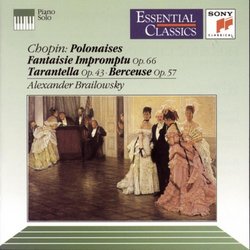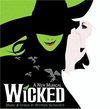| All Artists: Chopin, Brailowsky Title: Polonaises / Fantasie Impromptu Members Wishing: 0 Total Copies: 1 Label: Sony Original Release Date: 1/1/1991 Re-Release Date: 8/19/1991 Genres: Dance & Electronic, Classical Styles: Forms & Genres, Fantasies, Instruments, Keyboard Number of Discs: 1 SwapaCD Credits: 1 UPC: 074644654622 |
Search - Chopin, Brailowsky :: Polonaises / Fantasie Impromptu
 | Chopin, Brailowsky Polonaises / Fantasie Impromptu Genres: Dance & Electronic, Classical
![header=[] body=[This CD is available to be requested as disc only.]](/images/attributes/disc.png?v=15401716) ![header=[] body=[This CD is available to be requested with the disc and back insert.]](/images/attributes/disc_back.png?v=15401716) ![header=[] body=[This CD is available to be requested with the disc and front insert.]](/images/attributes/disc_front.png?v=15401716) ![header=[] body=[This CD is available to be requested with the disc, front and back inserts.]](/images/attributes/disc_front_back.png?v=15401716) |
Larger Image |
CD DetailsSimilarly Requested CDs
|
CD ReviewsChopin Polonaises - Heroic Tone Poems Peter Dietrich | Boston, MA United States | 10/15/2003 (4 out of 5 stars) "Chopin Polonaises - Heroic Tone Poems By Peter Dietrich President, Chopin Society of New EnglandThe Polonaise originates from the sixteenth century, with the coronation of Henri of Valois as the King of Poland in 1574. From that time on, the polonaise became a regular feature of coronation festivities in Poland. In this monarchy, whose king was elected, as a president of a republic, it became an established custom to welcome a new ruler with a procession of nobles. It became a majestic display of beautiful costumes and precious jewels. Thus, the processional dance known as the Polonaise was born for such ceremonial occasions. From Poland, the polonaise was "carried" to France and later to other European countries, where it attracted many great composers such as J.S. Bach, G.F. Handel, F. Couperin, W.A. Mozart, C.M. Weber, L. van Beethoven and many others. However, it was Fryderyk Chopin who elevated the polonaise to the highest form of art, which became a new form in composition - a heroic tone poem. In Aleksander Brailowsky's performances, they become a monumental group of compositions, where irresistible dynamics and rich inventions are molded into perfect artistic expression, in spite of some of them being played a little bit too fast in sections where a slower tempo would be more suitable. In the Polonaise in C-minor, Op. 40, No. 2 for instance, in the middle section the tempo becomes extremely fast. Due to an excessive use of the sustaining pedal, the playing becomes unclear and loses the processional feeling and rhythm of the polonaise despite the great technical control. The four juvenile polonaises are played with great feeling and musicianship, as well as the Fantasie Impromptu Op. 66, the Berceuse Op. 57 and the Tarantella Op. 43. I am very puzzled by Sony Music and their action - from the Polonaise in D-minor, Op. 72 No. 1 more than one (1) minute of music is removed when compared to the same recording originally issued by Columbia on an LP in 1963. The omission of that much music spoils an excellent performance by Aleksander Brailowsky. This CD does not provide any information as to why this omission occurred. Otherwise this CD is highly recommended, particularly at this low price. Aleksander Brailowsky has also recorded the Chopin Preludes Op. 28 and the Concerto in E-minor, Op. 11 with the Philadelphia Orchestra under the direction of Eugene Ormandy in the early sixties for Columbia Masterworks. These are deeply felt performances and would be very profitable if Sony Music could be persuaded to release them and other recordings of Aleksander Brailowsky. Other recordings of the polonaises of highest accord are that of Artur Rubinstein, (RCA/BMG), Witold Malcuzynski, (released on EMI/Angel) and Halina Czerny-Stefanska, (issued as part of the complete Chopin recording in 1960, Polish MUZA)." Brailowsky gives an uneven, but above average, performance.. Peter Dietrich | 07/29/1997 (4 out of 5 stars) " Alexander Brailowsky, whom I have already discussed on his CD of Chopin's Waltzes, is an underrated pianist, who plays pieces of the standard piano reportoire with almost no deviation from the normal renditions. His touch is almost always good, his playing light or heavy depending on what the piece calls for, and he excels at usually 2 or 3 pieces a CD. All this he brings to this Sony release of Chopin's Polonaises. Brailowsky plays the war-like polonaises with an absolute disregard for their ultimatly Polish origin. This does not mean that they do not contain some Polish aspects, but rather that they do not express any aspects about the origin of the music. I find this school of playing fascinating, without detracting from the music. This is the same avenue that Rubenstein and Kissin have gone, turning what would normally be a French version of a Polish dance into a wondrous piece, one which could possibly be likened to a Ballade or a Scherzo. I have always thought this was the correct way to go, but some listeners mind find it irritating, as these non-Polish renditions have little if any accent on the rhythmic quality of the music, and try as little as possible to demonstrate the nationalistic qualities of the music. But Arthur Rubenstein had the wonderful quality of providing everything a listener looked for in a piece, from Nationalism (though he did not intend it, by any means) to just plain beautiful piano music. The first question we must ask is this: Does Brailowsky's recording have this "universalness", so to speak? I would have to answer no, it does not. Brailowsky plays the Polonaises with no Nationalistic aspects whatsoever. But he does play imaginatively, unlike his waltz CD, and he delivers an album of several good performances, 1 or 2 great ones, and 1 or 2 poor ones. (Also on this CD is a Tarentella, the Fantasie-Impromtu, and the Berceuse- in other words, the miscelleneous pieces. In this review I will address only the Polonaises, though you can be assured the other pieces are played in the same way) The CD opens with the C# minor Polonaise, an old Horowitz favorite. I found Brailowsky's rendition to be only one fourth as ferocious as Horowitzs, or Ohlssons, or Rubensteins. His military Polonaise, in A major, and easily the second most popular of all the polonaises, is played with a charicteristically heavy hand, but also with a certain flamboyance that I found attractive. For the now popular F# minor Polonaise (the one Kissin played at his Carnegie hall debut), I found Brailowsky to be, like the C# minor, un-ferocious, and though it has a good flow, and is played very well technically, it lacks a certain power that most other pianists usually instill it with. That brings us to the infamous A flat major Polonaise, Op. 53, the so-called "Heroic" Polonaise. To many pianists and listeners, this Polonaise has been Chopin personified, and is the favorite of many a famous player, from Horowitz and Rubenstein, to Haraciewicz and Van Cliburn, and many, many others, as well as being featured in several movies, most notably Shine. Brailowsky plays it with vigorous use of the pedal, blurring many of the fast phrases, which I thought was original, though perhaps unneeded. He plays it with absolutly no rubato (varying the tempo to bring out different aspects, a trick that Chopin practically invented, and something that many Chopinist consider essential, and just as many cast away), so the piece plays straight through with very little change in pace or accentuation. I thoroughly enjoyed the middle section, in which is found the ferocity Brailowsky lacks on the other tracks, and the whole piece comes off nicely, with a good flair to it. However, I thought that the best Polonaise on this album was the Dm Polonaise, by far the best on the CD. I have not heard such an eerie Dm Polonaise in quite a while, and very few pianists (maybe 3 or 4 at most) could or can match this piece as played by Mr. Brailowsky. It is played very ethereally (that is, dreamily), with some rubato, and lots of spirit. I very much enjoyed it, and was left wishing the rest of the album had followed it in character. The lesser known Polonaises, though by no means lesser pieces, I felt were very plain and direct, and average in pretty much every regard. It now comes time for the second question pertaining to this CD: If you had to buy ONLY ONE CD of Chopin's Polonaises, would this be it? I would say no, though it was almost a yes. This CD has very little consistincy, as one track will be sullen and withdrawn, and the next ferocious and driven, and the next limpid and directionless. And though the renditions are of undoubted high quality, and though Brailowsky is a fine pianist, I think a better buy can be found with Rubenstein's Polonaises (RCA Victor), any of Horowitz's (assorted labels), and even Garrick Ohlsson's (Arabesque). If Kissin ever does more than the F# minor Polonaise (which is stunning, shattering, menacing, and breathtaking, all in one), than be sure to look for his CD of them. Summary= Brailowsky gives a largely uneven performance that is usually more good than bad. Good for comparing Polonaise recording, fans of Alexander Brailowsky, or for people who are big fans of the Dm Polonaise. Review= Evan Stephens END" Captures the Heart and Soul of the Polonaise Peter Dietrich | 10/08/1999 (5 out of 5 stars) "This album was the first Chopin I heard over 35 years ago and I have loved it ever since. It brims with fire, poetry and zeal. There's a certain rightness about Brailowsky's performance that has always made these renditions of the Polonaise my personal favorites. I love the heart and soul he pours into each one."
|

 Track Listings (13) - Disc #1
Track Listings (13) - Disc #1







